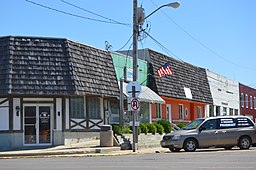Roanoke, Illinois
| Roanoke | |
| Village | |
|
Broad Street downtown
|
|
| Country | United States |
|---|---|
| State | Illinois |
| County | Woodford |
| Elevation | 724 ft (221 m) |
| Coordinates | 40°47′51″N 89°11′59″W / 40.79750°N 89.19972°WCoordinates: 40°47′51″N 89°11′59″W / 40.79750°N 89.19972°W |
| Area | 0.96 sq mi (2 km2) |
| - land | 0.92 sq mi (2 km2) |
| - water | 0.04 sq mi (0 km2) |
| Population | 2,065 (2010) |
| Density | 2,192.0/sq mi (846/km2) |
| Timezone | CST (UTC-6) |
| - summer (DST) | CDT (UTC-5) |
| Postal code | 61561 |
| Area code | 309 |
Roanoke is a village in Roanoke Township, Woodford County, Illinois, United States. The population was 2,065 at the 2010 census, up from 1,994 at the 2000 census. It is part of the Peoria, Illinois Metropolitan Statistical Area.
Until about 1850, much of northern Illinois was still frontier land and sparsely populated, which the exception of Chicago and towns along the rivers. This changed in 1850, when President Millard Fillmore signed a land grant for the construction of the Illinois Central Railroad (lobbied for by then-lawyers Stephen Douglas and Abraham Lincoln). With the railroad expanding into Central Illinois, new opportunities for settlement by German, Dutch, Irish, Italian, Swedish, and other European immigrants opened up in Woodford County.
Roanoke was one of these settlements. On December 17, 1872, Roanoke was mapped out and lots were offered for sale. The plat of Roanoke was composed of 15 blocks and was bounded by Main, Front, Ann and Pleasant Streets. Two years later in 1874, Roanoke officially became a "Village" in the State of Illinois. Building began immediately in Roanoke and by the time the railroad was complete the population had increased to three hundred. Henry Frantz put up the first building after the village was laid out, and John Frantz and Jacob Engle also opened pancake stores.
The first doctor in the town was Dr. John, who also served several terms as coroner. Fauber and Hall first bought grain in Roanoke, although they never had an elevator. They also dealt in coal. The lumberyard was conducted by Doc Miller but soon after passed into the hands of Phillip Moore, who was one of the pioneers in business life in the vicinity. On August 15, 1874, the first election was held for the purpose of electing six trustees for the Village of Roanoke. To this day, the Village has continually filled those six positions.
...
Wikipedia



